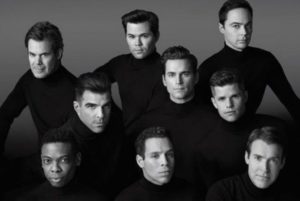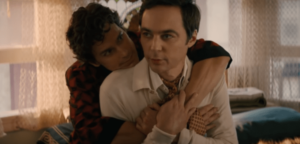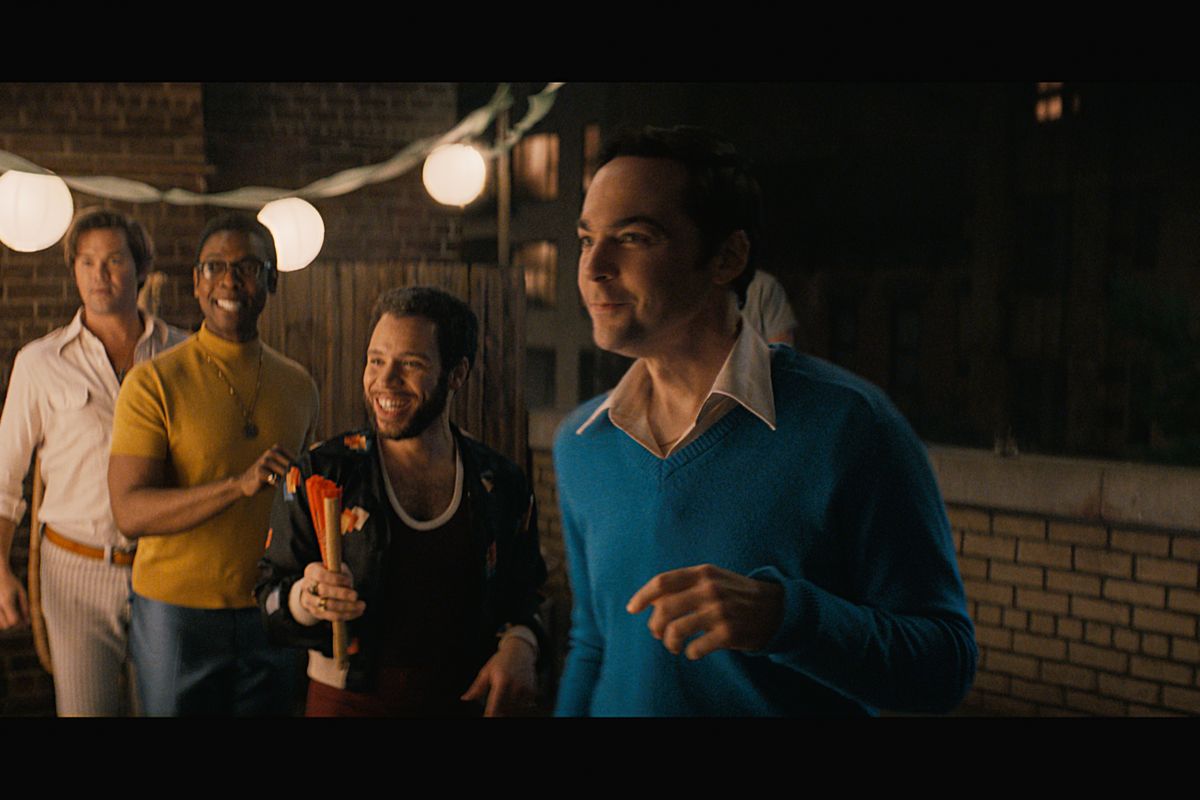It’s Harold’s birthday, what could go wrong?!

The Boys in the Band was initially performed on stage in 1968, made into a film in 1970, then returned to stage for a Broadway revival in 2018, only to be made into a film again with the same cast. The story has just as much “oomph” and relevance today as it did in the ’70s. With a cast of exceptional and exclusively openly gay actors, Boys in the Band takes themes of homophobia, racism, vanity, and substance abuse and subverts them into a party fit for “six tired screaming fairy queens and one anxious queer.” When a group of queer men gathers to celebrate in an NYC apartment right before a storm, there is lots of dancing, reading, and drinking to be expected. The contrasting tones of this film occur because the party host, Michael (played by Jim Parsons), allows his old “straight” college roommate, Alan (Brian Hutchinson), up to his apartment during the party. Before Alan arrives, the mood is light, and the men all dance together happily. Alan’s presence creates a conscious and rather dangerous environment for these men who believed they would be in a safe, judgment-free space at Michael’s apartment.
Alan is completely nervous around all these men, but why? Is he considering leaving his wife to be with a man? Did Alan come to Michael’s apartment seeking violence and judgment? (SPOILER) We are left without a definitive answer. Ultimately, Alan’s presence at the party is one of the main sources of tension throughout the film, but not the only one.

Boys in the Band touches on the niche and complex characteristics of gay men without relying too heavily on stereotypes. Each of them has depth as well as perfect comedic timing and theatrical rhythm. Zachary Quinto plays Harold, the stoned birthday boy who arrives considerably late. All before Harold arrives, Emory, played by Robin de Jesus, gets violently hit by Alan simply for his femininity, the cowboy escort he ordered for Harold arrives, and the cowboy kisses Michael, having mistaken him for Harold. Emory’s character represents the far side of the spectrum on gender expectation in the gay community, being the most flamboyant. Hank (played by Tuc Watkins) falls on the opposite side from Emory, being able to completely convince Alan that he is straight. The rest of the ensemble falls somewhere in between while having distinct and unique characteristics of their own. Nobody in this cast falls flat for me. It is clear that these are all extremely seasoned Broadway and Hollywood actors who have studied their characters and this script extensively. There is a rhythm to the screenplay that is performed so effortlessly by this cast, it’s mesmerizing. The overall diversity of the cast could be better with only two BIPOC actors, Michael Benjamin Washington as Bernard and Robin de Jesus as Emory, who both bring their individual identities to the table to share the specificities of their race and homosexuality as a pairing.

You might question the relevance of this piece due to our country’s more recent strides towards acceptance. I would argue that this display of half a dozen gay men in one space existing just for pleasure and friendship is not often seen on screen or stage. While this piece would certainly not pass the Bechdel test, there is something to be said about the sheer amount of representation it holds anyways. We see a wide range of masculine to feminine men as well as intimate discussion about the vanity and criticism that gay men tend to project onto each other. We see two men, Larry (played by the amazing Andrew Rannells) and Hank, who label themselves as roommates to hide their relationship status from Alan. There is a complex and ill-defined relationship between Michael and Donald (played by Matt Bomer) that has tenderness and light that is typically only seen in stories about heterosexual relationships. Most of the men at this party have come to terms with their identity. They can be themselves around each other and it’s amazing to watch. They criticize each other to an extent that proves that they know each other better than they may know themselves. This group represents a section of the LGBTQ+ community that is probably the most represented in film, but it’s a step in a good direction, no doubt.
After all the party-goers leave and Michael is left alone with Donald, a shame-induced panic attack occurs and Michael states, “If we could just learn not to hate ourselves quite so very much.” This leaves you with the hardest-hitting message of this piece: even if we can have acceptance, self-hate and shame still affect a large amount of the gay community today to a horrible degree. This story needed to be re-told because it’s still hard-hitting, relevant, and unbelievably entertaining due to the hard work of the all-star cast. I personally have been missing theatre desperately due to the COVID-19 shutdowns, so this play-turned-film brought me a little extra joy this week.

Movie Review originally published by Allie Posner 2/12/21

Comments